Related Research Articles
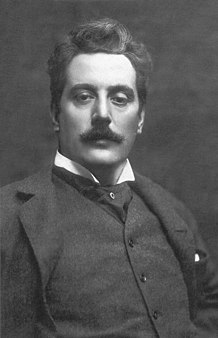
Giacomo Puccini was an Italian composer known primarily for his operas. Regarded as the greatest and most successful proponent of Italian opera after Verdi, he was descended from a long line of composers, stemming from the late-Baroque era. Though his early work was firmly rooted in traditional late-19th-century Romantic Italian opera he later developed his work in the realistic verismo style, of which he became one of the leading exponents.
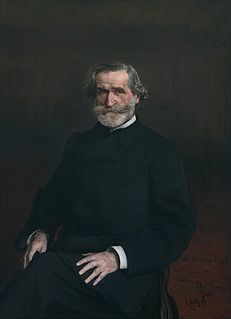
Giuseppe Fortunino Francesco Verdi was an Italian composer best known for his operas. He was born near Busseto to a provincial family of moderate means, receiving a musical education with the help of a local patron. Verdi came to dominate the Italian opera scene after the era of Gioachino Rossini, Gaetano Donizetti, and Vincenzo Bellini, whose works significantly influenced him.
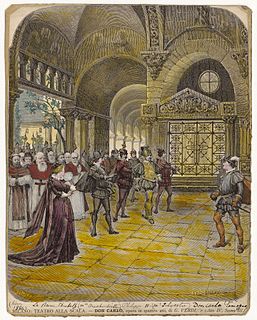
Don Carlos is a five-act grand opera composed by Giuseppe Verdi to a French-language libretto by Joseph Méry and Camille du Locle, based on the dramatic play Don Carlos, Infant von Spanien by Friedrich Schiller. In addition, several incidents, of which the Forest of Fontainebleau scene and auto-da-fé were the most substantial, were borrowed from Eugène Cormon's 1846 play Philippe II, Roi d'Espagne. The opera is most often performed in Italian translation, usually under the title Don Carlo.

The unification of Italy, also known as the Risorgimento, was the 19th-century political and social movement that resulted in the consolidation of different states of the Italian Peninsula into a single state, the Kingdom of Italy. Inspired by the rebellions in the 1820s and 1830s against the outcome of the Congress of Vienna, the unification process was precipitated by the revolutions of 1848, and reached completion in 1871, when Rome was officially designated the capital of the Kingdom of Italy.

Otello is an opera in four acts by Giuseppe Verdi to an Italian libretto by Arrigo Boito, based on Shakespeare's play Othello. It was Verdi's penultimate opera, first performed at the Teatro alla Scala, Milan, on 5 February 1887.
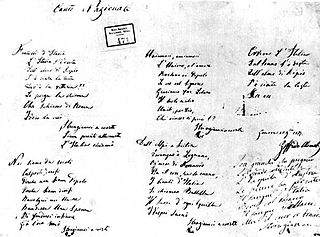
"Il Canto degli Italiani" is a canto written by Goffredo Mameli set to music by Michele Novaro in 1847, and is the current national anthem of Italy. It is best known among Italians as the Inno di Mameli, after the author of the lyrics, or Fratelli d'Italia, from its opening line. The piece, a 4/4 in B-flat major, consists of six strophes and a refrain that is sung at the end of each strophe. The sixth group of verses, which is almost never performed, recalls the text of the first strophe.

Simon Boccanegra is an opera with a prologue and three acts by Giuseppe Verdi to an Italian libretto by Francesco Maria Piave, based on the play Simón Bocanegra (1843) by Antonio García Gutiérrez, whose play El trovador had been the basis for Verdi's 1853 opera, Il trovatore.
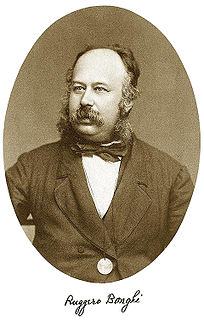
Ruggero Bonghi was am Italian scholar, writer and politician.

Antonio Ghislanzoni was an Italian journalist, poet, and novelist who wrote librettos for Verdi, among other composers, of which the best known are Aida and the revised version of La forza del destino.
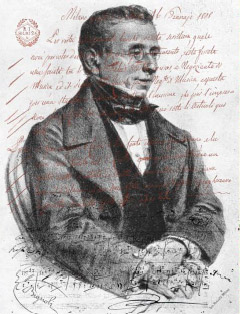
Casa Ricordi is a publisher of primarily classical music and opera. Its classical repertoire represents one of the important sources in the world through its publishing of the work of the major 19th-century Italian composers such as Gioachino Rossini, Gaetano Donizetti, Vincenzo Bellini, Giuseppe Verdi, and, later in the century, Giacomo Puccini, composers with whom one or another of the Ricordi family came into close contact.

The Messa per Rossini is a Requiem Mass composed to commemorate the first anniversary of Gioachino Rossini's death. It was a collaboration among 13 Italian composers, initiated by Giuseppe Verdi. The composition was intended to be performed on 13 November 1869 in the Basilica of San Petronio, Bologna, where Rossini grew up and spent a large part of his life.
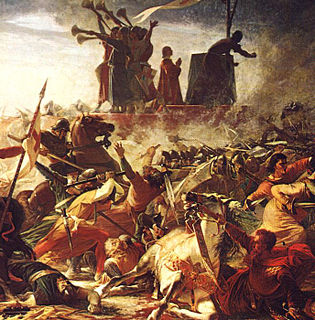
La battaglia di Legnano is an opera in four acts, with music by Giuseppe Verdi to an Italian-language libretto by Salvadore Cammarano. It was based on the play La Bataille de Toulouse by Joseph Méry, later the co-librettist of Don Carlos.
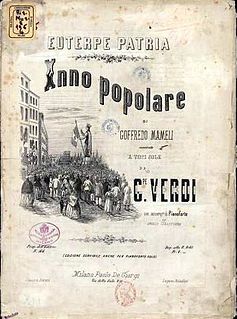
"Suona la tromba" or "Inno popolare" was a secular hymn composed by Giuseppe Verdi in 1848 to a text by the Italian poet and patriot Goffredo Mameli. The work's title comes from the opening line of Mameli's poem. It has sometimes been referred to as "Grido di guerra".

Francesco (Franco) Antonio Faccio was an Italian composer and conductor. Born in Verona, he studied music at the Milan Conservatory from 1855 where he was a pupil of Stefano Ronchetti-Monteviti and, as scholar William Ashbrook notes, "where he struck up a lifelong friendship with Arrigo Boito, two years his junior" and with whom he was to collaborate in many ways.

Teodulo Mabellini was an Italian composer.
Bernadette Manca di Nissa is an Italian operatic contralto who has sung leading roles in the principal opera houses of Italy as well as internationally. She has appeared at La Scala in Milan, La Fenice in Venice, Teatro San Carlo in Naples, and the Maggio Musicale Fiorentino in Florence as well as at the Royal Opera House, Covent Garden and Gran Teatre del Liceu in Barcelona.
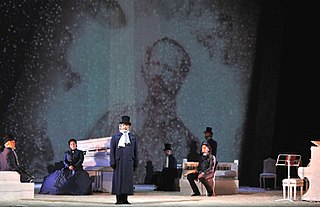
Risorgimento! is an opera in one act by Lorenzo Ferrero set to an Italian-language libretto by Dario Oliveri, based on a scenario by the composer. It was completed in 2010 and first performed at the Teatro Comunale Modena on 26 March 2011.
Giulietta Pezzi was an Italian writer and journalist whose work included poetry, four novels, and a five-act play. Born and educated in Milan, she was a devoted follower of Mazzini and active in the Italian republican and unification movements. In her later years she wrote for several newspapers and dedicated herself to the establishment of free public schools in Italy based on Mazzini's educational philosophy. She died in the city of her birth at the age of 71. During her lifetime several art songs were dedicated to her, including Bellini's "Vaga luna, che inargenti".

Giovanni "Gino" Visconti Venosta was a Milanese writer-scholar and, as a young man, an activist Italian patriot.

Leopoldo Metlicovitz was an Italian painter, illustrator and poster designer.
References
- ↑ "I Giornali ... "La Perseveranza"". Instituto Comprensivo "G. Ferrari", Momo (Novara). Archived from the original on 6 March 2016. Retrieved 19 March 2016.
- ↑ Giuseppe Verdi (letter writer); Pierluigi Petrobelli (compiler) (1988). Footnote 1, beneath letter to Giulio Ricordi, December 1880. Carteggio Verdi-Ricordi 1880-1881 (published exchange of letters). Instituto di studi verdiana, Parma. p. 92. ISBN 88-85065-05-8.
- ↑ Maria Assunta De Nicola, Mario Borsa. Biografia di un giornalista, 2012, Università della Tuscia, p. 28.
- ↑ Steed, Henry Wickham (1911). . In Chisholm, Hugh (ed.). Encyclopædia Britannica . 04 (11th ed.). Cambridge University Press. p. 204.
- ↑ Federico Chabod (author); William McCuaig (translator 1996) (1951). What Prussia had to teach. Italian Foreign Policy: The Statecraft of the Founders, 1870-1896. Princeton University Press, NJ. p. 49. ISBN 88-420-3595-5.